Oddly enough, I’ve only seen one squirrel at LWR this spring, but this is apparently the year of the rabbit. Last update’s three wee ones were released–rabbits tend to scatter when they’re released, but I did get one good shot of one of the babies as he took off into the brush.
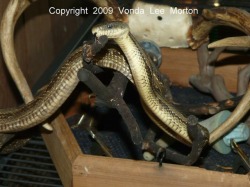
I also had another somewhat less welcome visitor, as a rat snake coming out of hibernation found his way onto my porch. Rat snakes aren’t poisonous, and since I had some mice on the porch I wanted gone, I was actually not unpleased by his appearance...except that he slithered off the porch without ridding me of one pesky mouse!
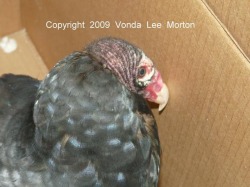
And while this fellow never made the "most handsome" list, turkey vultures and all their carrion-eating kin and friends do perform a valuable service: just think how much death we’d literally be walking around in if not for these birds. Unfortunately, they also projectile puke as a self-defense mechanism (stop and think about their diet, which has then simmered in digestive juices for a while before they spew it back out at their attackers), so veterinarian Peggy Hobby and I went to great lengths to avoid his effortless upchucking when I took him in for an exam. Sadly, his wing was damaged beyond repair and he had to be euthanized.
Harvey is still eating at the LWR buffet and will be with me for longer than I expected. The little snot managed to break the flight feathers on his formerly broken wing by preening excessively while the wing was bandaged. I’m starting to think he just likes the grub and digs and looks for ways not to leave!
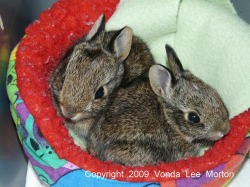
I also had two additional baby rabbits come in, both of whom were doing great and then developed enteritis overnight and died the next day. This is the really frustrating thing about rehabbing rabbits: they can be doing fine one day and you wake up to find them dead or dying the next, and there are so few meds that don’t interfere with their sensitive little guts. Rabbits are such fragile little things: even in the wild only about 10 percent of rabbits born survive their first year. This is why they breed like, well, rabbits!
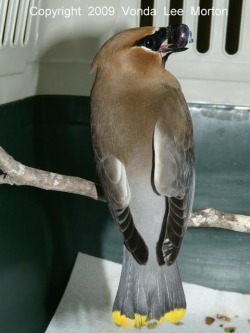
While cedar waxwings don’t breed in Georgia, they do pass through during fall and spring migrations, and this fellow initially came in with what we thought was just a hangover–these birds are notorious for eating fermented berries until they’re too drunk to fly. He began developing other problems, though, including persistent diarrhea, rapid weight loss and difficulty breathing. The Cornell Lab of Ornithology could offer no suggestions other than what we were already doing, so because of the severity of his weight loss and the increasing respiratory difficulty, we opted for euthanasia–it seemed the kindest option.
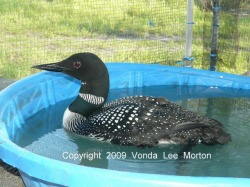
This past weekend was stormy here in Georgia, and it caused another migrating visitor to be grounded–literally. Loons are large birds whose bodies are designed for ease of movement in water, not on land. This guy landed in a rain-soaked front yard and couldn’t take off again: loons need large bodies of water to "run" across as they build up speed to take off. This loon was the first resident of my new flight pen–in my next update, I’ll post photos of some of the improvements made to LWR’s facilities during the "slow" season–where he remained for a couple of days for observation before release. He was one more happy loon upon his release!
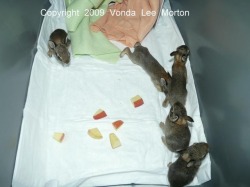
And returning to my earlier comment about this being the year of the rabbit, on Sunday I received five–count ‘em, FIVE!–babies whose eyes were just beginning to open. To make a long story short, their mother had been hit by a car. We’re taking it day by day with these five, doing everything possible to avoid stressing them, and hoping that they survive to be released. Keep your fingers crossed for these wee ones as they begin to discover solid foods. So far they really like apple slices and baby greens!
This is the time of year that birds begin nesting and raising young, so to protect the birds in your yard, keep your cats and dogs inside and avoid the use of pesticides and insecticides on flowers and grass–those toxic chemical cocktails can often kill songbirds within hours. A few weeds are a small price to pay for a yard full of songbirds, don’t you agree?
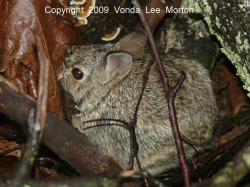
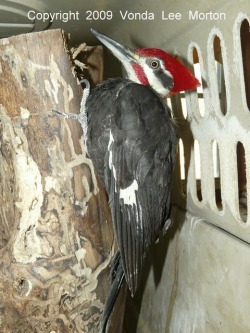
 RSS Feed
RSS Feed
